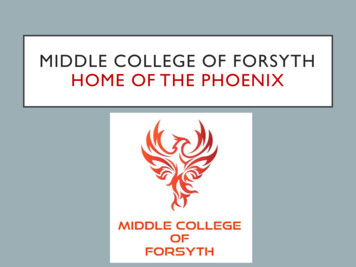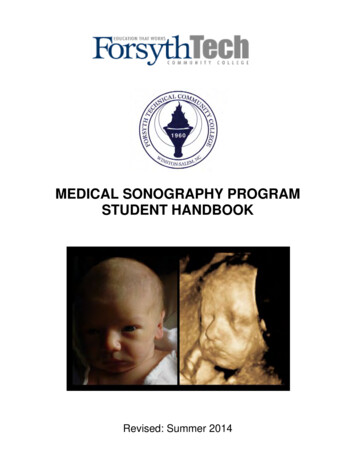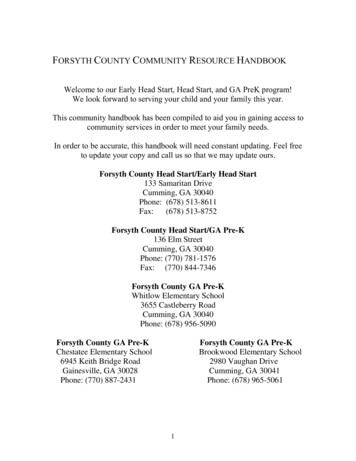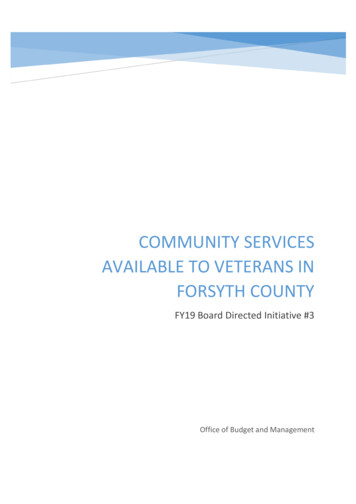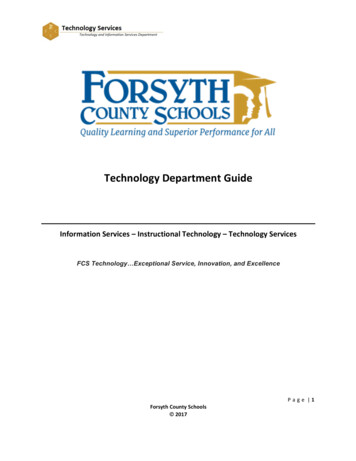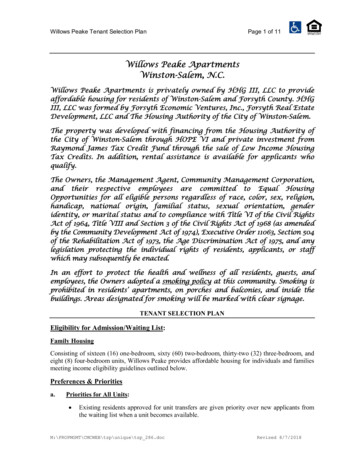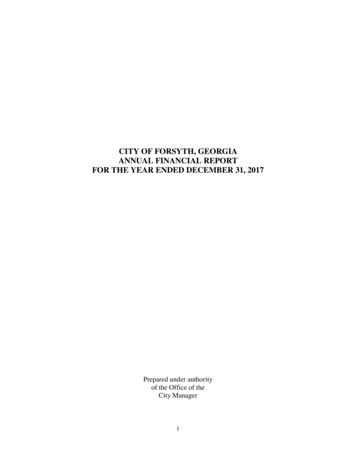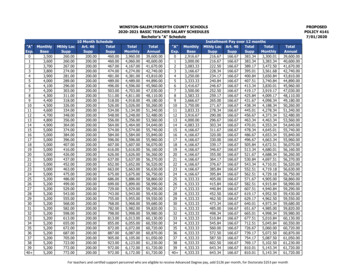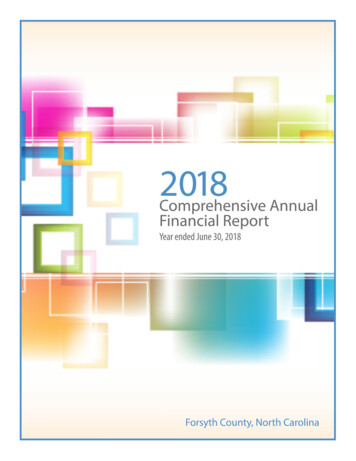
Transcription
Forsyth County,North CarolinaComprehensive Annual Financial ReportFor the Fiscal Year Ended June 30, 2018Prepared by the Forsyth County Finance Department:Paul L. Fulton, Jr., CPA, Chief Financial OfficerTerri L. Goodman, CPA, Deputy Chief Financial OfficerLee H. Plunkett, Assistant Chief Financial OfficerMichael J. Phelps, CPA, Controller and Systems ManagerTeresa G. Everhart, CISR, Risk ManagerJean-Baptiste A. Lagnie, Internal AuditorMatthew W. Day, Fiscal AnalystAdam J. Fernbach, Fiscal AnalystManjeet Singh, Fiscal AnalystGloria M. Turowski, Fiscal AnalystBarbara A. Cassidy, Safety/Loss Control AnalystMarta Soriano, Risk Management AnalystRegina G. Ireland, Fiscal SupervisorMary Elizabeth (Beth) Godwin, Accounting SpecialistPadma Kamatkar, Accounting SpecialistDaphne Avery, Payroll SpecialistBonita J. Gray, Payroll SpecialistLinda T. Bowles, Fiscal TechnicianPatricia L. Martin, Fiscal TechnicianMichelle A. Powell, Fiscal TechnicianBeverly W. Smith, Fiscal TechnicianKathy F. Taylor, Fiscal Technician
This page intentionally left blank
Forsyth County, North CarolinaComprehensive Annual Financial ReportFor the Fiscal Year Ended June 30, 2018TABLE OF CONTENTSPageI. Introductory Section:Letter of TransmittalBoard of County Commissioners and County OfficialsOrganization ChartCertificate of Achievement for Excellence in Financial ReportingII. Financial Section:Report of Independent AuditorManagement’s Discussion and AnalysisBasic Financial Statements:Government-wide Financial Statements:Exhibit 1Statement of Net PositionExhibit 2Statement of ActivitiesFund Financial Statements:Exhibit 3Balance Sheet – Governmental FundsExhibit 4Statement of Revenues, Expenditures, and Changes in Fund Balances – Governmental FundsExhibit 4.1 Reconciliation of the Statement of Revenues, Expenditures, and Changes in Fund Balances ofGovernmental Funds to the Statement of ActivitiesExhibit 5Statement of Revenues, Expenditures, and Changes in Fund Balance – Budget and Actual –General FundExhibit 6Statement of Net Position – Proprietary Fund – Internal Service FundExhibit 7Statement of Revenues, Expenses, and Changes in Net Position – Proprietary Fund –Internal Service FundExhibit 8Statement of Cash Flows – Proprietary Fund – Internal Service FundExhibit 9Statement of Fiduciary Net Position – Fiduciary FundsExhibit 10 Statement of Changes in Fiduciary Net Position – Fiduciary FundsNotes to the Financial StatementsRequired Supplementary InformationLocal Governmental Employees’ Retirement System – Schedule of Proportionate Share of theNet Pension Liability (Asset)Local Governmental Employees’ Retirement System – Schedule of Employer ContributionsLaw Enforcement Officers’ Special Separation Allowance - Schedule of Changes in Total Pension Liability (Asset)Law Enforcement Officers’ Special Separation Allowance - Schedule of Total Pension Liability (Asset) as aPercentage of Covered PayrollLaw Enforcement Officers’ Special Separation Allowance – Notes to the Required SchedulesRegister of Deeds’ Supplemental Pension Fund – Schedule of Proportionate Share of the Net Pension Liability (Asset)Register of Deeds’ Supplemental Pension Fund – Schedule of Employer ContributionsHealthcare Plan – Schedule of Changes in Net OPEB Liability and Related RatiosHealthcare Plan – Schedule of Employer ContributionsHealthcare Plan – Schedule of Investment ReturnsBudgetary Comparison Schedules – Major Governmental Funds:Schedule of Revenues, Expenditures, and Changes in Fund Balance – Budget and ActualA-1General 35354545556565758
Schedule of Revenues, Expenditures, and Changes in Fund Balance – Budget and Actual – From Inception:A-22011 Library Bond FundA-32016 Schools Facilities Fund6161Combining and Individual Fund Financial Statements and Schedules - Nonmajor Governmental Funds:B-1Combining Balance SheetB-2Combining Statement of Revenues, Expenditures, and Changes in Fund Balances626465Nonmajor Special Revenue Funds:C-1Combining Balance SheetC-2Combining Statement of Revenues, Expenditures, and Changes in Fund Balances6668Schedules of Revenues, Expenditures, and Changes in Fund Balance – Budget and Actual:C-3Fire Tax Districts FundC-4Law Enforcement Equitable Distribution FundC-5Emergency Telephone System FundC-6Moser Bequest for Care of Elderly Fund70727273Schedules of Revenues, Expenditures, and Changes in Fund Balance – Budget and Actual – From Inception:C-7State Public School Building Capital FundC-82014 Housing FundC-92015 Housing FundC-102016 Housing FundC-112017 Housing FundC-122018 Housing FundC-132019 Housing Fund73747576777879Nonmajor Capital Projects Funds:D-1Combining Balance SheetD-2Combining Statement of Revenues, Expenditures, and Changes in Fund Balances8082Schedules of Revenues, Expenditures, and Changes in Fund Balance – Budget and Actual – From Inception:D-32009 Phillips Building (Phases 1A and 1B) FundD-42012 2/3rds Bonds FundD-52014 FTCC Carolina Building Renovation FundD-62014 2/3rds Bonds FundD-72014 Winston-Salem/Forsyth County Schools Capital Maintenance FundD-82014 Forsyth Technical Community College Capital Maintenance FundD-92015 Winston-Salem/Forsyth County Schools Facilities FundD-102016 Motive Equipment Replacement FundD-112016 New Family Museum FundD-122016 2/3rds Bonds FundD-132016 Winston-Salem/Forsyth County Schools Capital Maintenance FundD-142016 Forsyth Technical Community College Capital Maintenance FundD-152016 Pay-Go FundD-162016 Forsyth Technical Community College Facilities FundD-172016 Parks and Recreation Facilities FundD-182017 Court Facilities FundD-192017 Tanglewood Business Park Fund8687878888898990919292939394949595Fiduciary Funds: Agency FundsE-1Combining Statement of Fiduciary Assets and LiabilitiesE-2Combining Statement of Changes in Assets and Liabilities969798Other Schedules:F-1Schedule of Ad Valorem Taxes Receivable - General FundF-2Analysis of Current Tax Levy - Countywide LevyF-3Ten Largest Taxpayers99101102103
III. Statistical Section:Schedule 1Schedule 2Schedule 3Schedule 4Schedule 5Schedule 6Schedule 7Schedule 8Schedule 9Schedule 10Schedule 11Schedule 12Schedule 13Schedule 14Schedule 15Schedule 16Net Position by Component - Last Ten Fiscal YearsChanges in Net Position - Last Ten Fiscal YearsFund Balances of Governmental Funds - Last Ten Fiscal YearsChanges in Fund Balances of Governmental Funds - Last Ten Fiscal YearsAssessed Value and Actual Value of Taxable Property - Last Ten Fiscal YearsDirect and Overlapping Property Tax Rates - Last Ten Fiscal YearsPrincipal Property Tax Payers – Current Year and Ten Years AgoProperty Tax Levies and Collections – Last Ten Fiscal YearsRatios of Outstanding Debt by Type - Last Ten Fiscal YearsDirect and Overlapping Governmental Activities DebtLegal Debt Margin Information - Last Ten Fiscal YearsDemographic and Economic Statistics - Last Ten Calendar YearsPrincipal Employers – Current Year and Ten Years AgoFull-Time-Equivalent County Government Employees by Function - Last Ten Fiscal YearsOperating Indicators by Function – Last Ten Fiscal YearsCapital Asset Statistics by Function – Last Ten Fiscal YearsIV. Compliance Section:Report of Independent Auditor on Internal Control over Financial Reporting and on Compliance andOther Matters Based on an Audit of Financial Statements Performed in Accordance withGovernment Auditing StandardsReport of Independent Auditor on Compliance for Each Major Federal Program and on Internal Control OverCompliance in accordance with OMB Uniform Guidance and the State Single Audit Implementation ActReport of Independent Auditor on Compliance for Each Major State Program and on Internal Control OverCompliance in accordance with OMB Uniform Guidance and the State Single Audit Implementation ActSchedule of Expenditures of Federal and State AwardsNotes to Schedule of Expenditures of Federal and State AwardsSchedule of Findings and Questioned CostsSchedule of Corrective Action PlanSummary of Prior Year 120121123125127129131135136138139
This page intentionally left blank
FINANCE DEPARTMENTPaul L. Fulton, Jr., CPAMichael J. Phelps, CPACHIEF FINANCIAL OFFICERMANAGERCONTROLLER AND SYSTEMSTerri L. Goodman, CPATeresa G. Everhart, CISRDEPUTY CHIEF FINANCIAL OFFICERRISK MANAGERLee H. PlunkettPenny K. Efird, CPAASSISTANT CHIEF FINANCIAL OFFICERINTERNAL AUDIT MANAGERNovember 5, 2018Honorable Members of the Forsyth County Board of Commissionersand Citizens of Forsyth County, North Carolina:State law requires that all local governments publish within four months of the close of each fiscalyear a complete set of financial statements presented in conformity with generally acceptedaccounting principles (GAAP) and audited in accordance with generally accepted auditingstandards by a firm of licensed certified public accountants. Pursuant to that requirement, wehereby issue the comprehensive annual financial report of Forsyth County for the fiscal year endedJune 30, 2018.This report consists of management’s representations concerning the finances of Forsyth County.Consequently, management assumes full responsibility for the completeness and reliability of all ofthe information presented in this report. To provide a reasonable basis for making theserepresentations, management of Forsyth County has established a comprehensive internal controlframework that is designed both to protect the government’s assets from loss, theft, or misuse andto compile sufficient reliable information for the preparation of Forsyth County’s financialstatements in conformity with GAAP. Because the cost of internal controls should not outweightheir benefits, Forsyth County’s comprehensive framework of internal controls has been designedto provide reasonable rather than absolute assurance that the financial statements will be free frommaterial misstatement. As management, we assert that, to the best of our knowledge and belief,this financial report is complete and reliable in all material respects.Forsyth County’s financial statements have been audited by Elliott Davis, PLLC, a firm of licensedcertified public accountants. The goal of the independent audit was to provide reasonableassurance that the financial statements of Forsyth County for the fiscal year ended June 30, 2018,are free of material misstatement. The independent audit involved examining, on a test basis,evidence supporting the amounts and disclosures in the financial statements; assessing theaccounting principles used and significant estimates made by management; and evaluating theoverall financial presentation. The independent auditor concluded, based upon the audit, thatthere was a reasonable basis for rendering an unmodified opinion that Forsyth County’s financialstatements for the fiscal year ended June 30, 2018, are fairly presented in conformity with GAAP.The independent auditors’ report is presented as the first component of the financial section of thisreport.The independent audit of the financial statements of Forsyth County was part of a broader,federally mandated “Single Audit” designed to meet the special needs of federal grantor agencies.The standards governing Single Audit engagements require the independent auditor to report notI
only on the fair presentation of the financial statements, but also on the audited government’sinternal controls and compliance with legal requirements, with special emphasis on internalcontrols and legal requirements involving the administration of federal awards. These reports areavailable in the compliance section of this report.GAAP require that management provide a narrative introduction, overview, and analysis toaccompany the basic financial statements in the form of Management’s Discussion and Analysis(MD&A.) This letter of transmittal is designed to complement MD&A and should be read inconjunction with it. Forsyth County’s MD&A can be found immediately following the report ofindependent auditors.Profile of the GovernmentForsyth County is located in the northwestern piedmont section of the state and includes the Cityof Winston-Salem, which is the County seat and fifth most populous city in the state. The Countywas created by Act of the North Carolina General Assembly in 1849. The County operates undera commission-manager form of government with seven publicly elected commissioners comprisingthe governing body. The County is divided into two districts for election purposes, andcommissioners are elected on a staggered basis for terms of four years: two from one district, fourfrom the second district, and one at-large. The Board of Commissioners meets twice a month toadopt local regulations and ordinances, establish policies, make appointments, and set the level ofservices to be provided to County residents. Forsyth County is empowered by state statute to levya property tax on both real and personal properties located within its boundaries. The Board ofCommissioners annually adopts a balanced budget and establishes a tax rate for the support ofCounty programs. The County’s annual budget allocates its resources for the health, education,welfare, and protection of its citizens. The County Manager is appointed by and serves at thepleasure of the Board of Commissioners. The manager, administrative staff, and all departmentsof County government must administer the County programs in accordance with the policies andannual budget ordinance adopted by the Board of Commissioners.The mission of Forsyth County government is to help create a community, which is safe andhealthy, convenient and pleasant to live in, with educational and economic opportunities foreveryone. We cooperate with many other public agencies and community organizations in thismission. We provide certain services and functions, which are responsibilities of all countygovernments, and other services, which the Board of Commissioners has determined to benecessary and appropriate. We are committed to providing quality services, efficiently andeffectively, with courteous attention to the opinions and needs of individual citizens. To fulfill itsmission, Forsyth County provides a broad range of services that include public safety,environmental protection, health and social services, cultural and recreational programs,community and economic development, and education. This report encompasses the County’sactivities in maintaining these services and includes its financial support to certain separateagencies, boards, and commissions to assist their efforts in serving citizens. Among these are theWinston-Salem/Forsyth County Schools and Forsyth Technical Community College.The financial reporting entity includes all funds of the primary government, Forsyth County, as wellas its component unit. Component units are legally separate entities for which the primarygovernment is financially accountable. The Forsyth County Industrial Facilities and PollutionControl Financing Authority is a component unit of Forsyth County; however, this authority has nofinancial transactions or account balances and, therefore, is not reported in the financialstatements.The annual budget serves as the foundation for Forsyth County’s financial planning and control.Each year all County departments are required to submit requests for appropriations to the CountyManager, who then compiles a proposed budget and presents it to the Board of Commissioners forII
review. The Board is required to hold public hearings on the proposed budget and to adopt a finalbudget by July 1 of the fiscal year, or the Board must adopt an interim budget that covers that timeuntil the annual ordinance can be adopted. The annual ordinance includes appropriations for theGeneral Fund and four annually budgeted special revenue funds. Note 1c provides additionalinformation on budgetary data. Budget-to-actual comparisons are provided in this report for eachindividual governmental fund for which an appropriated annual budget has been adopted. For theGeneral Fund, this comparison is presented on page 16 as part of the basic financial statementsfor the governmental funds and, in greater detail, on pages 58 - 60 in the subsection for major fundbudgetary comparison schedules. For annually budgeted special revenue funds, this comparisonis presented in the nonmajor governmental fund subsection of this report, which starts on page 62.Also included in the governmental fund subsection are project-length budget-to-actualcomparisons for each nonmajor governmental fund for which a project-length budget has beenadopted (i.e., grant project special revenue funds and capital project funds).Attesting to the sound financial management of the Board of Commissioners, the County remainsone of only a handful of AAA-rated counties nationwide, as ranked by Standard & Poor’s, FitchRatings, and Moody’s Investor Services.Factors Affecting Financial ConditionThe information presented in the financial statements is perhaps best understood when it isconsidered from the broader perspective of the specific environment within which Forsyth Countyoperates.Local economy. Located midway between Washington, D.C. and Atlanta, Georgia, Forsyth Countyis in the heart of the state’s Piedmont Triad region, a 12-county area with more than 1.7 millionpeople. Three cities comprise the Triad: Winston-Salem, Greensboro and High Point. Each city hasits own character, its own heritage, and its own industrial base. Yet the area’s commercial andcultural growth transcends geographic boundaries with the strengths of each city combining to form avibrant economic hub.Forsyth County, with an estimated population of 372,651 and a workforce of more than 185,000,plays a vital role in the Triad’s economy. With a strong and well diversified core of manufacturingcompanies, health care, biotechnology, financial services, and tourism sectors, the County serves asthe major employment center for the counties which comprise northwest North Carolina and portionsof southwest Virginia. The County’s average unemployment rate for the year ended June 30, 2018 is4.2 percent, which is lower than the State rate of 4.3 percent and slightly higher than the national rateof 4.1 percent.Economic resilience and employment stability have formed the foundation for strong local consumerand commercial markets. The most recent per capita personal income levels from 2016 remainconsistently higher than state figures. The County’s per capita income is 44,672, the twelfth highestamong counties in the state, and higher than the State’s 42,244. Capital investment, as measured bythe value of new residential and commercial building permits issued during the year, totaled 567.5million during the year ended June 30, 2018, an increase of 8.4 percent over the prior year.Long-term financial planning. The Forsyth County Major Capital Improvements Program(“CIP”) is the result of an ongoing process by County officials to assess the need for major capitalexpenditures, the feasibility of funding these projects, and to establish an orderly plan forimplementing these projects. The CIP is reviewed by the Commissioners periodically, usuallytwice a year, once at the annual Commissioners' Planning Workshop, and then again during theirannual budget deliberations.III
As of June 30, 2018, the County’s CIP through the year 2024 consists of 481.9 million forproposed projects funded with long term financing. General obligation bonds will be incurred forpublic schools ( 288 million), community college projects ( 55.65 million), park systemdevelopment and maintenance ( 17.250 million), and County general capital maintenance ( 6.0million). A replacement of court facilities now housed in the Hall of Justice ( 115 million) will befunded with limited obligation bonds. Sales of property and other revenues will fund replacement ofthe Kaleideum facility ( 17.84 million). An upgrade or replacement of the joint Forsyth County/Cityof Winston-Salem 800 MHz Radio System ( 9 million County share) is under consideration forfunding from current appropriations or Pay-Go if available. A bond referendum, approved inNovember 2016, provides the bulk of schools, community college and park system developmentand maintenance funds with the balance coming from non-voter approved two-thirds bonds.Financial Policies. These financial policies are the basis for our budgeting decisions:Tax Rate - The Board of Commissioners strives to limit the growth of the annual operating budgetto an amount which can be accommodated by growth in the tax base as well as other local, stateand federal revenues, without a tax rate increase, whenever possible. The fiscal year 2018 taxrate of .7235 is .0075 lower than the prior year rate of .7310.Education Debt Leveling Plan (“EDLP”) – In order to level the effects of issuing the 250 millionschools and 25 million community college bonds authorized in the November 2006 referendum,the County has dedicated proceeds from the state education lottery and from a 3-cent property taxincrease first levied in fiscal year 2008 to debt service on these bonds. Similarly, the fiscal year2010 budget included an additional 1.1-cent tax increase over the revenue-neutral rate to fund the 62 million educational facilities bond authorization approved in the November 2008 referendum.These EDLP tax rates were adjusted to .033 and .0121 for the 2006 and 2008 EDLP reserves,respectively, following the fiscal year 2014 revaluation. No additional tax increases are anticipatedto pay this debt service. Each year lottery funds will be applied first, and the balance of applicabledebt service will be paid from fund balance designated from the 3.3-cent and 1.21-cent levies plusany interest on that designated fund balance. The EDLP currently has a balance of 14.7 million.Library Debt Leveling Plan (“LDLP”) – In order to level the effects of issuing the 40 million librarybonds authorized in the November 2010 referendum, the County has dedicated proceeds a .0057property tax increase first levied in fiscal year 2016 to debt service on these bonds. No additionaltax increases are anticipated to pay this debt service. Each year applicable debt service will bepaid from fund balance designated from the .0057 levy plus any interest on that designated fundbalance. The LDLP currently has a balance of 1.7 million.Public Improvement Debt Leveling Plan (“PIDLP”) – In order to level the effects of issuing the 83.5 million schools, 15.5 million community college, and 3.6 million parks bonds authorized inthe November 2016 referendum, the County has dedicated proceeds from annual operatingcontributions and from a 2.9-cent property tax increase first levied in fiscal year 2018 to debtservice on these bonds. No additional tax increases are anticipated to pay this debt service. Eachyear applicable debt service will be paid from fund balance designated from the 2.9-cent levy plusany interest on that designated fund balance. The PIDLP currently has a balance of 7.9 million.Debt Policy - Forsyth County recognizes that a formally adopted debt policy is fundamental tosound financial management. The fiscal year 2018 budget was adopted under the policy goal thatthe total annual debt service for long-term obligations would not exceed 18% of the appropriationsin the annually adopted budget as shown in the Budget Ordinance. The policy of keeping debtservice at less than a specified percent of the budget can greatly influence the timing and/oramount of funding for a project, as well as the method of funding.IV
Fund Balance Policy – Available fund balance in the General Fund should be at least 14% of thesubsequent year’s budget. The County exceeded this policy target ending the 2018 fiscal yearwith an available fund balance, net of committed fund balance, of 20.1% of its 2019 budget. 9.7million of available fund balance was appropriated to balance the fiscal 2019 budget leaving 17.8%available fund balance of which 14% was set aside in accordance with the County’s fund balancepolicy. The remaining 3.8%, or 13.2 million, was assigned for fiscal 2019 management specialprojects and capital maintenance projects. One of the County’s goals for future budgets is toreduce the amount of appropriated fund balance needed to balance the budget.Major Initiatives. While fiscal stress remains for businesses, citizens and local governments,modest projections for continuing recovery have proved to be correct. Higher than expectedrevenue realization in property taxes in 2018 have resulted in a continuing strong balance sheet.Additionally, continued efforts at reorganization, re-engineering of work processes, efficiencyimprovements and other efforts to control costs have provided some easing of budgetarypressures. The County expects to have a strong focus on these types of efforts as it seeks to findand implement innovative strategies and systems throughout the organization.Forsyth County is continuing its transition from a manufacturing base to a more balanced economywith growth in medical, medical research and services sectors. The County expects growth tocontinue with the transition.The focus of the fiscal year 2019 budget is on maintaining the policies which form the financialfoundation of the County; the 18% debt ceiling, the 14% fund balance target, the school, libraryand public improvement debt leveling plans, the school funding formula which uses economic anddemographic data to determine growth in school funding, and the use of a multi-year approach tomitigate effects of revaluations. Also, capital maintenance plans for the County, schools andcommunity college which utilize two-thirds bonds for funding every other year provide resources tokeep facilities safe, sound and usable and allow for maintenance planning over the life of facilities.The County provides all of its statutory services and a variety of services which, though notrequired, have strong public support. The County does not expect to undertake any major newprograms, projects or expansion of services without substantial public support for both the servicesand the tax rate increase, if necessary, to support them.Awards and AcknowledgementsAwards. The Government Finance Officers Association of the United States and Canada (GFOA)awarded a Certificate of Achievement for Excellence in Financial Reporting to Forsyth County forits comprehensive annual financial report for the fiscal year ended June 30, 2017. This was the34th consecutive year that the County has achieved this prestigious award. In order to be awardeda Certificate of Achievement, the County must publish an easily readable and efficiently organizedcomprehensive annual financial report. This report must satisfy both generally acceptedaccounting principles and applicable legal requirements.A Certificate of Achievement is valid for a period of one year only. We believe that our currentcomprehensive annual financial report continues to meet the Certificate of Achievement Program'srequirements, and we are submitting it to the GFOA to determine its eligibility for anothercertificate.GFOA also presented the County with a Distinguished Budget Presentation Award for the County'sfiscal year 2018 annual budget. To receive this award, a governmental unit must publish a budgetdocument that meets program criteria. This award is valid for one year only. We believe the fiscalyear 2019 budget continues to conform to program requirements, and we are submitting it toGFOA to determine eligibility for another award.V
Acknowledgements. The preparation of the annual financial report was made possible by thededicated service of the entire staff of the Finance Department. The year-end closing of theaccounting system, report preparation and overall coordination was effectively managed by Terri L.Goodman, Deputy Chief Financial Officer. Also providing substantial support in report preparationand related accounting activities were: Lee H. Plunkett, Assistant Chief Financial Officer; MichaelJ. Phelps, Controller and Systems Manager; Teresa Everhart, Risk Manager; Jean-BaptisteLagnie, Internal Auditor; and, Gloria Turowski, Fiscal Analyst.In closing, without the continued leadership and support of the Board of County Commissioners,preparation of this report would not have been possible.Sincerely,J. Dudley Watts, Jr.County ManagerPaul L. Fulton, Jr.Chief Financial OfficerVI
Forsyth County Board of CommissionersSeated (left to right): Chairman David R. Plyler , Gloria D. Whisenhunt and Vice-Chairman Don MartinStanding (left to right): Richard V. Linville, Everette Witherspoon, Fleming El-Amin and Ted KaplanCounty OfficialsJ. Dudley Watts, Jr.County ManagerPaul L. Fulton, Jr.Chief Financial OfficerVII
CITIZENS OF FORSYTH COUNTYBoard ofEducationSheriffBoard ofCommissionersRegister of Deeds(1)(2)Community CollegeBoard of TrusteesBoard ofHealthClerkBoard ofSocial ServicesAttorneyState Boardof ElectionsBoard of ElectionsManagerPublic mmunityand EconomicDevelopmentEnvironmental AffairsYouth ServicesEconomic DevelopmentBudget and ManagementHousingManagement InformationEnvironmentalProtectionAnimal ControlNC CooperativeLibraryEmergency ServicesExtension ServiceParks and RecreationNC Cooperative ExtensionSocial ServicesYouth CenterForsyth TechnicalService‐Soil and WaterPublic HealthCommunity sFinanceGeneral ServicesWinston‐Salem/ForsythHuman ResourcesCounty SchoolsTax AdministrationMapForsythDenotes supervisory relationshipJOINT FUNCTIONS ADMINISTERED BY THEBoard of ElectionsCITY OF WINSTON‐SALEMRegister of DeedsDenotes funding relationship Four of thirteen members appointed by theGovernor Two of five members appointed by the StateSocial Services Commission VIIIPlanningPurchasingInspectionsEmergency ManagementUtilities
IX
This page intentionally left blankX
Independent Auditor’s ReportThe Board of C
Forsyth County's financial statements have been audited by Elliott Davis, PLLC, a firm of licensed certified public accountants. The goal of the independent audit was to provide reasonable assurance that the financial statements of Forsyth County for the fiscal year ended June 30, 2018, are free of material misstatement.
